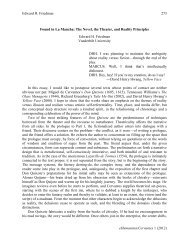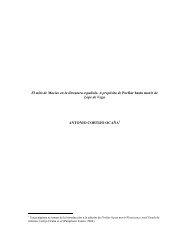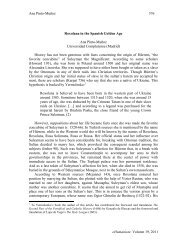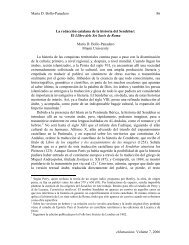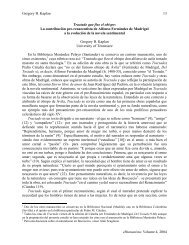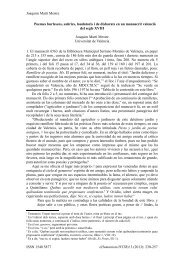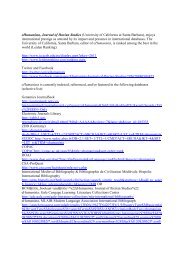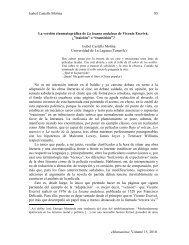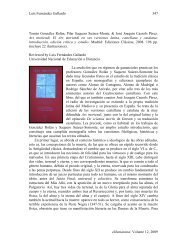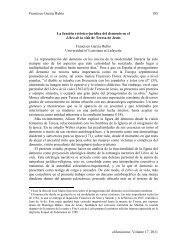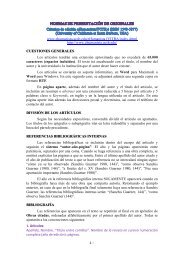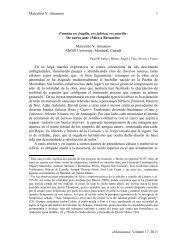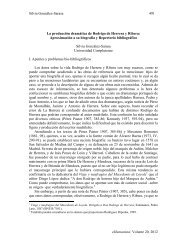Gregory Peter Andrachuk eHumanista: Volume 17, 2011 540 Alonso ...
Gregory Peter Andrachuk eHumanista: Volume 17, 2011 540 Alonso ...
Gregory Peter Andrachuk eHumanista: Volume 17, 2011 540 Alonso ...
Create successful ePaper yourself
Turn your PDF publications into a flip-book with our unique Google optimized e-Paper software.
<strong>Gregory</strong> <strong>Peter</strong> <strong>Andrachuk</strong><br />
individualizing aspects of his life, much as for us a public figure who writes is still<br />
predominantly a public figure, not a writer. 22<br />
<strong>Alonso</strong> de Cardona is the author of some twenty-two compositions included in the<br />
Cancionero General, the majority of which explore typical cancionero themes. 23<br />
While we can be certain of his presence at the viceregal court of Germaine de Foix<br />
and her husband the Duke of Calabria at Valencia in the third decade of the 16 th<br />
century and, conversely, of his absence from a certamen poético in Valencia in<br />
November of 1511, little more is definitely known about the life of <strong>Alonso</strong> de Cardona<br />
as poet. 24<br />
Some details of the life of <strong>Alonso</strong> de Cardona as courtier are, however, recorded.<br />
There are a number of references to his participation in the siege of Perpignan in 1503.<br />
Both Ferrando Francés (400) and Aybar Ramírez (57, n.5) note that <strong>Alonso</strong> de<br />
Cardona was in the company of King Ferdinand at the siege in early August, 1503.<br />
Among his companions in this enterprise are Francisco Fenollet and Serafín de<br />
Centelles y Cardona, Conde de Oliva, both of whom are connected to characters in<br />
Qüestión de amor, the former being the brother of Jerónimo de Fenollet, alter ego of<br />
Flamiano, and the latter being either his cousin or uncle. 25 Ventura Pascual y Beltrán<br />
(252) cites from Fr. Diago´s Apuntamientos: “1503: A la jornada de Perpiñán<br />
acudieron muchos Valencianos cavalleros ricamente adereçados, con muchas cadenas<br />
de oro, y pocos sin dos o tres cauallos cada qual; don <strong>Alonso</strong> de Cardona que después<br />
fue Almirante de Aragón...don Seraphin Centelles, Conde de Oliva, don Cherubín<br />
Centelles su hermano...don Francisco Fenollet...” 26 A more specific reference to the<br />
22 Again, the comments of Pérez Bosch are apposite: “El poeta que compone poesía para ser recitada en<br />
la corte es el mismo que se encarga de otros asuntos cotidianos de tipo administrativo, político,<br />
jurídico” (4).<br />
23 In <strong>Andrachuk</strong> 1994b I explored the poetry of <strong>Alonso</strong> de Cardona vis-à-vis that which forms part of<br />
Qüestión de amor (427-34) and remarked that “there are important thematic similarities between<br />
Cardona’s verse and the poetry of Qüestión de amor, especially the poetry in the authorial voice of<br />
Vasquirán, which go beyond the expected coincidences of cancionero verse” (434). But I also stated<br />
that “nothing is known about <strong>Alonso</strong> de Cardona beyond the fact that he is the poet of the Cancionero<br />
General compositions” (434). It now seems possible to move forward with the knowledge that the poet<br />
is the same person as the Almirante de Aragón.<br />
24 Ferrando Francés 679. His mention of the “notòria absença total dels poets aristocrats valencians com<br />
Serafí de Centelles” as well as <strong>Alonso</strong> de Cardona, clearly implies the expected presence and the<br />
importance of these poets. The fact that Francisco de Fenollet (brother of Jerónimo de Fenollet), was<br />
present at this certamen and acted in an official capacity is another element in the connection between<br />
social, artistic and political spheres of Valencia and the court of Naples depicted in Qüestión de amor.<br />
25 Vigier says that Serafín de Centelles is “oncle maternel de Jerónimo de Fenollet” (27-28) while an<br />
18 th century source, Fray Vicente Ximeno (cited in Perea Rodríguez 229) says “Francesc...era primo del<br />
Conde de Oliva”.<br />
26 The identification of this <strong>Alonso</strong> de Cardona as eventual Almirante de Aragón is of importance.<br />
Pascual y Beltrán (249) cites from Mossén Francés Joan´s Libre de noticias de la ciutat de Valencia on<br />
the Fenollet brothers, Francisco and Jerónimo: “...el uno llamado don Francisco, el cual fuel paje del<br />
Rey Católico...y el otro que se llamó don Jerónimo, el cual fue capitán de un estandarte de hombres de<br />
armas en la jornada de Ravena, año 1512.” The companionship of the Fenollet brothers with <strong>Alonso</strong> de<br />
550<br />
<strong>eHumanista</strong>: <strong>Volume</strong> <strong>17</strong>, <strong>2011</strong>



